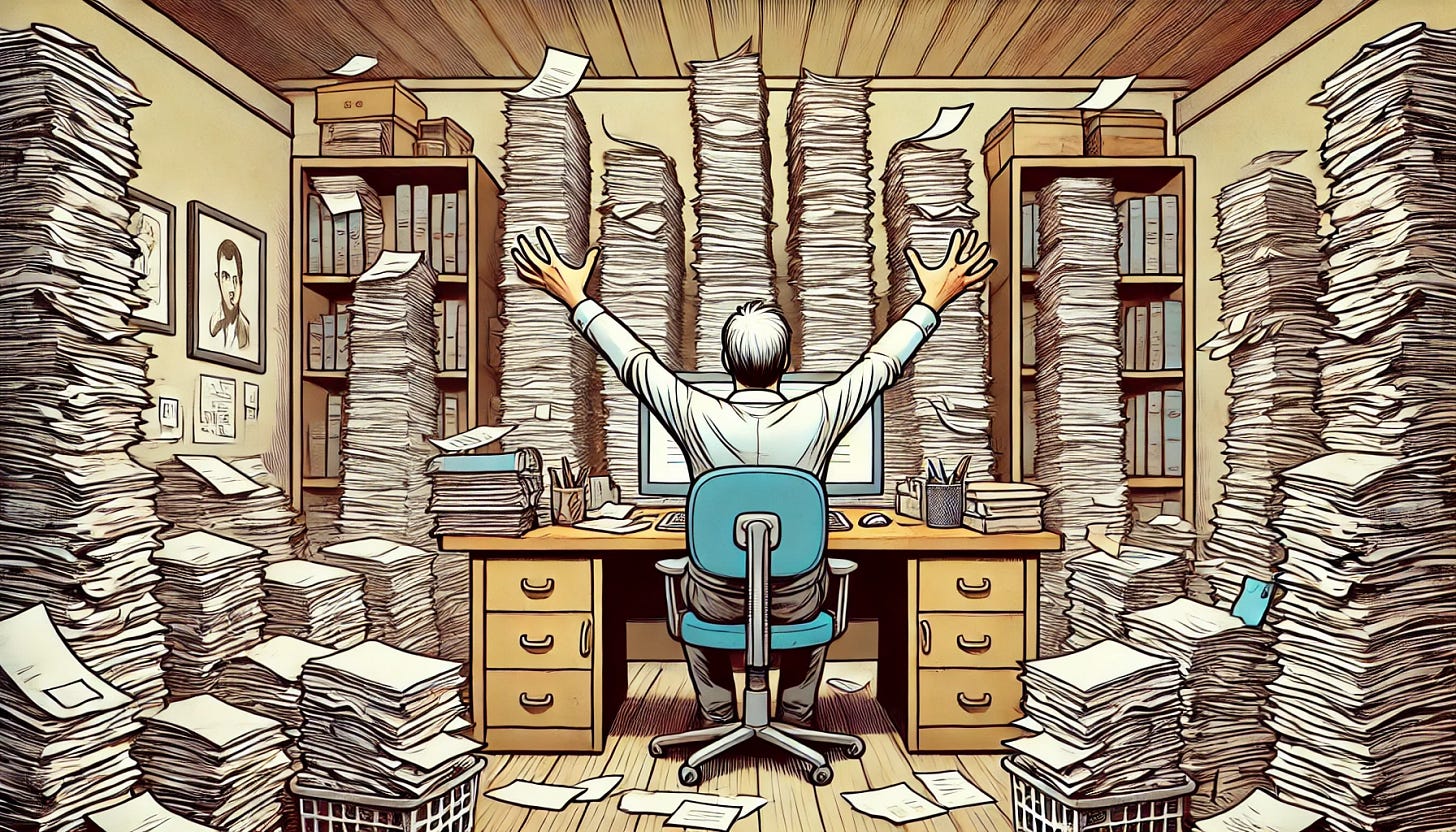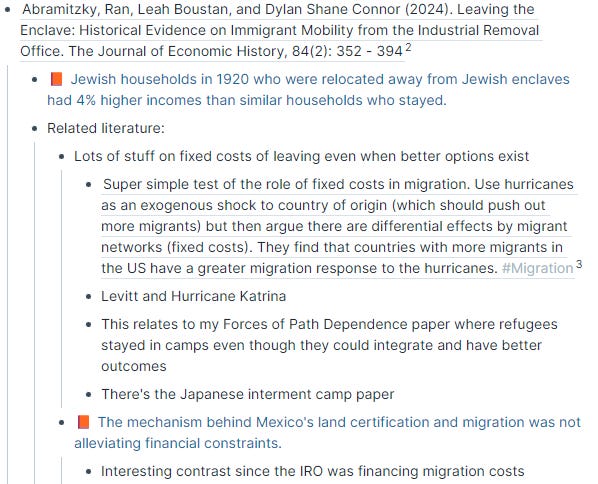On April 1, 2024, I decided that every day I would read at least one economics paper.
Since I recently hit my 100th day of doing it, I thought now was a good moment to reflect on what this habit has done for me.
The changes I noticed
I started coming up with better research ideas.
Before starting this habit, I had started a separate habit of brainstorming one new research idea each day. In graduate school, I did something similar to this, but recently I realized I wasn’t generating many new ideas anymore. This was the research equivalent of a first-world problem: I generated so many ideas in the past that I keep busy working on those. But new ideas are fun, and it’s important to lay the foundation for the future, so I started the habit.
But a lot of my ideas were awful. Even worse, my brainstorm was more like a braindrought. I kept pulling the idea bucket up from the brain well, but it was always empty. I’d eventually get an idea so I could check it off, but they weren’t exciting.
36 days after I started my research idea habit, I started my research paper habit. It was like the clouds broke and the well had water again. My research ideas came easier and they were better. I won’t pursue most of them, but some of them look like they could turn into papers.
Why did reading lead to more ideas? A lot of times the easiest thing to do was ask, “How could I do this in Haiti?” Most of the time, it wasn’t something that was feasible, but that at least started a thought process that created a new idea. Another path was, “What related question did this paper not address?” Those were the most fun when I knew my question could be answered with their data. I could write a paper without even having to collect a new dataset! Or sometimes I’d see a paper that shows the negative effect of a policy and I’d wonder about the flip side.
One caveat to finding research ideas like this is that the ideas feel more derivative. But I also came up with some bangers, so I wouldn’t write discount this strategy.
I started having more insights
I think the most underrated book for young learners is How to Take Smart Notes by Sonke Ahrens. The basic idea is that you should be taking notes on what you learn and collecting ideas over time. As Andy Matuschak puts it, knowledge work should accrete.
When you read 100 papers, there are bound to be connections between them. The problem is that when you’re on paper 98, it’s hard to remember what you read in paper 2. So my note taking system was the hidden hero helping this habit. After reading a paper, I’d jot some notes about my takeaways. Then I’d browse my notes for connecting ideas in other papers.
Here’s an example. The paper’s citation is the first bullet point. The first sub-bullet is the takeaway I found most interesting: this relocation project for Jews living in enclaves raised their incomes by 4%. Then I have a bunch of connecting ideas.
My note taking system is setup to find connections no matter when I read papers. But it was much easier to connect ideas when I was reading so many papers in a short time. Those connections are what frequently built up to be the research ideas I mentioned above.
I enjoyed conferences more
As a general preference, I do not like conferences. Part of it is leaving my wife at home with six kids. Another part is that social scenes at conferences are often centered on coffee and alcohol, but I don’t drink either. Finally, another part is seeing a lot of work that’s not interesting to me.
But I attended a conference during this experiment, and I noticed something. I was more interested in the presentations. Maybe this was because it was just a good conference. But I think a big factor was that I had a lot of papers in my cache and I could see more connections than usual. This wasn’t an accident. I picked sessions that were related to the types of papers I had been reading, so the connections were obvious. I also had better questions and comments because I had more work to draw from.
Advice for anyone wanting to try this
I’m sure my writing has been so moving that some of you may want to try this experiment. Here’s my advice.
Track it
The single biggest thing that got this habit done was tracking it. I used a spare journal, but you can use whatever you want. Every day, as part of my nightly routine, I would make a note of how many days in a row I had read a paper. That single number was all of the accountability I needed.
Set a simple goal
So I kind of lied at the beginning of this post. I said my goal was to read a paper every day, but really it was to read an abstract every day. I thought that goal was simple enough that even if I had the craziest day, I had no excuse for not reading a 100-word abstract. But abstracts are the gateway drug. Once you get a taste of that, you start craving more, and soon you’re reading the whole paper. As a result, even though my goal was to just read one paragraph, the majority of the time I read the entire paper.
Choose papers related to a project
Sometimes I read the random papers that are mentioned in blogs or on twitter. But the most helpful thing I did was find papers related to projects. I already mentioned my migration project. Another one I’m working on is related to removing trade barriers. In both cases, I just collected a group of papers and read them over a few days.






I was doubtful about my ability to read 100 papers in 100 days, but I feel much more confident about reading 100 abstracts in 100 days. If some of those turn into full paper reads, even better. I'm curious how you decided which abstracts to read. Were you basing it on NBER digests?
Nice post!
One of my habits is to read through the titles of every NBER Working Paper and IZA Discussion Paper, then read the abstracts of the ones that interest me / are related to my projects, then read/cite the papers that are most interesting / related.
I use Feedly RSS reader to keep track of the newly released papers, and I just check them off in that website once I've reviewed them.